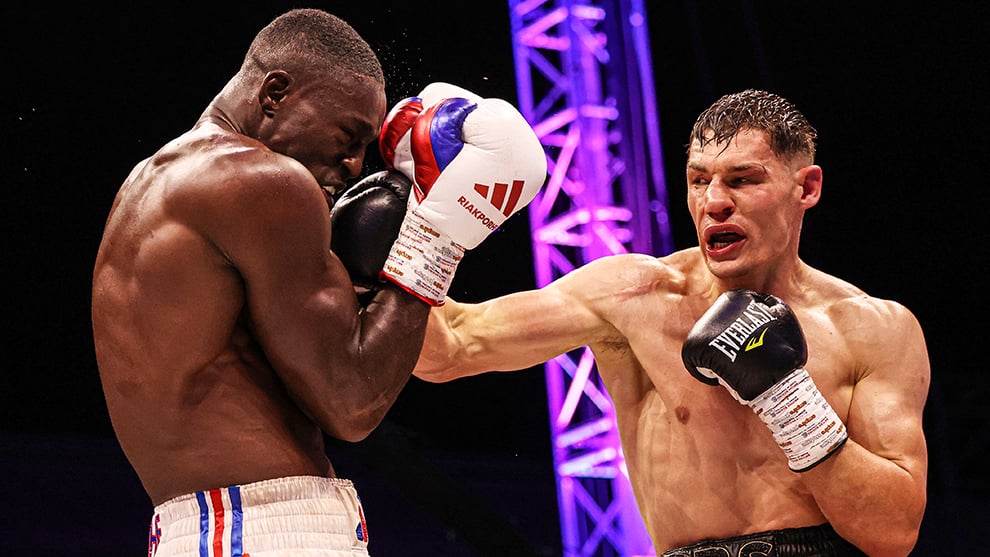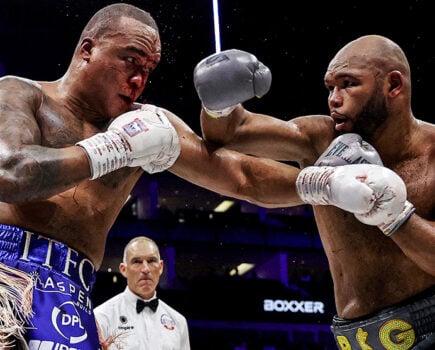TWICE now, in the space of 13 months, Chris Billam-Smith has worn the expression of the boy on the playground infuriated with the classmate who, rather than kick the football, appears to get a kick out of picking it up with his hands every time it comes anywhere near him. Reminded often that they are playing football and not rugby, the boy with the ball in his hands then turns and says, “But in America this is how they play football.”
Funnier to the boy with the ball in his hands than it is to the boy who wants to kick this same ball, neither boy in that moment is necessarily wrong. However, only for one of them is this situation exasperating and, in the context of the boxing ring, this land of far fewer grey areas, there is,, it should be pointed out, a clear distinction between a boxer who wants to fight and one who would rather be doing something else.
That is not to say Richard Riakporhe, Billam-Smith’s opponent last night (June 15) in Croydon, was reluctant to do the very thing for which he was getting paid, but the difference between the two cruiserweights’ attitudes was almost as marked as the difference between those of the boys on the playground unsure whether a ball should be kicked or carried.
Billam-Smith, for his part, is and has always been all action; kicker rather than carrier. Indeed, if there is one small knock against him it is that he is transparent – read: predictable – in his desire and willingness to get down to business and have a proper, traditional fight. It is this very mentality, in fact, that has both endeared him to so many British boxing fans and had prospective opponents licking their lips when considering a fight against him. Because, with Billam-Smith, you know what you are getting. Moreover, you get what you want.
Or at least that you used to be the case. Recently, you see, Billam-Smith has learned that the old adage about two fighters making a fight is one rooted in truth and not just something a boxer says when they have failed to impress in their big moment. He realised this against Lawrence Okolie, from whom he won his WBO cruiserweight belt last May, and he realised it all over again last night when Riakporhe, like Okolie, brought to the ring as much uncertainty as athleticism and as much negativity as power.
In the latter case – that is, with Riakporhe – it came as more of a surprise, but that doesn’t mean it was any less disappointing for Billam-Smith and his fans. In fact, because it was a surprise, and because Riakporhe wasn’t expected to spoil his way through the fight, the reality of what happened at Selhurst Park made the spectacle somehow even uglier than Billam-Smith vs. Okolie in Bournemouth last May. At least that night it was warm.
This, unfortunately, was one of those cruiserweight fights they once told you to avoid. It was dominated largely by Billam-Smith, who remained professional and workmanlike throughout, and only once, in round nine, did it threaten to explode and become something more than what it was: an eyesore. In that round, the ninth, Riakporhe at last burst into life. He landed a right hand early in the round, which sent Billam-Smith’s mouth guard flying, and he then landed two further right hands, one with a minute to go and one in the final 30 seconds, both of which had Billam-Smith unsettled, if not hurt.
Right on time, those shots brought an otherwise quiet crowd back around and their hope now was that Riakporhe would build on this slight shift in momentum and give them an exciting final three rounds. Riakporhe, however, had other ideas. Rather than build on his success in the ninth, he treated the following three rounds the same as the vast majority of the earlier rounds. Which is to say, he looked for right hands, he kept looking for right hands, and then, at the point at which it seemed a good idea to stop looking for them and let go of one, Riakporhe would invariably initiate and seek refuge in a clinch. Worse, it was in this position he tended to linger, unsure how to either break from the clinch he initiated or, and this would make sense, effectively work away on the inside against a fighter and champion who has never shown an aversion to an up-close battle.

Billam-Smith throws his right (Richard Heathcote/Getty Images)
This never happened, sadly, and, what is more, Riakporhe, now 17-1 (13), wasn’t warned for his holding – which was relentless, by the way – until round 11, by which time Steve Gray, the referee, had finally had enough and delivered his “final warning”. In truth, this final warning should have come much earlier, for at least then Riakporhe would have thought twice about crowding in search of protection. It may even have helped Riakporhe, too, to know that he now had no option but to maintain his distance and punch.
In the end, the warning, for both Riakporhe and the fans, came much too late and the point he lost in the next round, the 12th, happened to be for using his head rather than holding, which only added to the strangeness of this bout. Billam-Smith, meanwhile, as is his custom, just shrugged and got on with it. This wasn’t his kind of fight, clearly, but it was still a fight he had to treat with respect, a fight he had to see through to its conclusion, and a fight he had to win.
Which he did, of course, albeit thanks to three scorecards a little too close to comfort: 116-111, 115-112, 115-112. Bear in mind the point deduction Riakporhe received in round 12 and those scores become even more alarming, yet, for Billam-Smith, 20-1 (13), all that really matters is the win.
Still improving, the 33-year-old has, in the space of 13 months, now beaten his two closest domestic rivals and, even more impressively, managed to not only avenge his sole career defeat (against Riakporhe in 2019) but manoeuvre his way past these awkward opponents in fights that go against everything Chris Billam-Smith represents. To beat them, in other words, he had to embrace ugly. He had to endure frustration and try not to let that become his biggest threat. He had to then hold it all together and see it through.
In the process of doing this, entertainment had to be sacrificed, and any effort to please the crowd, which is what built Billam-Smith’s reputation a couple of years ago, was now futile. There would, for the 24 rounds he spent indulging Okolie and Riakporhe, be no opportunity to gain new fans or elevate his profile to the next level, but that is okay. That, for Billam-Smith, can wait. This, he knew, was just something he had to get beyond; something he had to tolerate and then rise above. The fun stuff can start again when they find him an opponent who shares the same beliefs.






